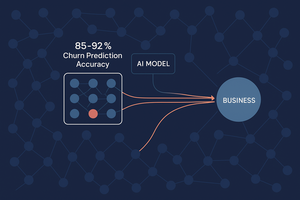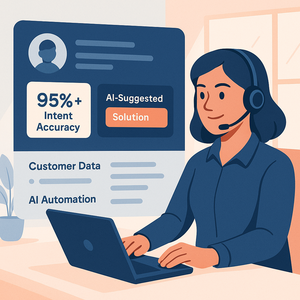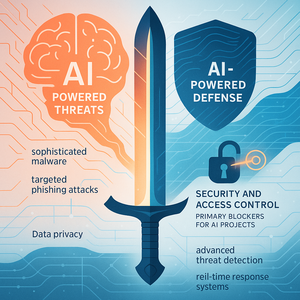Navigating the AI Transformation Tightrope: Balancing Innovation, Regulation, and Human Capital
The artificial intelligence landscape in late 2025 presents a complex picture of immense opportunity tempered by significant operational challenges....
6 min read
 Peter Vogel
:
July 17, 2025
Peter Vogel
:
July 17, 2025

The AI landscape continues its relentless evolution, presenting organisations with both unprecedented opportunities and complex challenges. This week's developments highlight significant shifts in talent acquisition, ethical considerations, and the underlying infrastructure required to support enterprise-ready AI. Understanding these trends is crucial for any organisation seeking to leverage AI for competitive advantage.
At Helium42, we distil the most critical AI developments, offering actionable guidance for business leaders and technology executives. This briefing is essential for Operations/Technology Executives, Marketing Leaders, Growth-Focused CEOs, Sales Directors, and Customer Service Leaders who need to understand how these shifts impact their strategic objectives and operational efficiency. We also touch on implications for HR/Training Leaders and Educational Institution Leaders, providing a comprehensive overview of the transformative forces at play.

Meta's strategic pivot towards AI, driven by competitive pressures from OpenAI and other industry leaders, is becoming increasingly apparent. The pursuit of superintelligence has ignited a talent war and a hardware arms race, with Meta positioned as a key player. Domination in this next wave of AI requires not only innovative models but also the infrastructure and expertise to deploy them effectively. Meta's aggressive talent acquisition strategy is a testament to its ambition. The company has poached AI researchers from OpenAI, DeepMind, and Apple, offering lucrative compensation packages to secure top-tier expertise. For instance, Meta hired key AI scientists from Google DeepMind, offering £10M+ compensation packages to build multi-modal AGI systems (Reuters, 2025). These high-profile hires are joining Meta's newly formed Super Intelligence Lab, signalling a clear strategic shift towards internal control of AI development. This strategy extends to significant investments; Meta's £14.3 billion acquisition of a 49% stake in Scale AI provides access to vital datasets and infrastructure (Meta Q2 2025 Earnings Report). However, Meta's path isn't without obstacles. Acquisition offers like the one made to Safe Superintelligence Inc. (SSI) were rejected, highlighting the independent vision and confidence of other players in the field (Ilia Sutskever, 2025). Furthermore, regulatory scrutiny over Meta's data practices poses a significant challenge. The EU is investigating Meta for allegedly using European user data without consent to train Llama 4, potentially leading to fines of up to €500M (BBC, 2025). To support its AI ambitions, Meta is massively expanding its GPU infrastructure. The Financial Times reported that Meta deployed 200,000 new Nvidia Blackwell GPUs, bringing its AI infrastructure to 600,000 GPUs—the world’s largest private cluster (Financial Times, 2025). This infrastructure build-out enables the training of larger, more complex models, reducing time-to-market for AGI prototypes.

The focus in the AI world is now shifting from theoretical possibilities to practical deployment. Enterprise-ready AI demands robust infrastructure, specialised expertise in MLOps, and a strong ethical foundation. The challenge lies in bridging the gap between promising models and real-world implementation to achieve measurable business impact. Microsoft's launch of the ""AI Factory"" implementation platform exemplifies this trend. This turnkey solution integrates Azure AI services with deployment toolkits specifically designed for manufacturing and logistics (TechCrunch, 2025). This initiative aims to accelerate industrial AI adoption by reducing implementation barriers. Similarly, NVIDIA's unveiling of Blackwell Ultra chips, which are four times more efficient for real-time model inferencing, addresses the need for robust infrastructure in resource-constrained environments (The Verge, 2025). However, the path to successful AI implementation is not always smooth. A McKinsey report revealed that 78% of AI projects stall in implementation, with data pipeline integration identified as the primary bottleneck (Harvard Business Review, 2025). This underscores the importance of investing in MLOps expertise to streamline AI deployment and ensure scalability. Furthermore, the EU AI Act, which began enforcement on July 1st, mandates risk assessments for high-impact AI systems (Financial Times, 2025). This regulatory pressure forces organisations to prioritise explainability and compliance in AI deployment, highlighting the critical role of ethical AI frameworks.

As AI continues to permeate various industries, concerns about job displacement are escalating. The narrative is shifting from futuristic anxieties to tangible impacts on the workforce, particularly for entry-level white-collar roles. Adapting to this changing landscape requires proactive reskilling and ethical transition strategies. The UK government's launch of a National AI Reskilling Fund, with £2.3 billion allocated to reskill workers displaced by AI in key sectors like retail, finance, and logistics, sets a precedent for state-led adaptation (BBC, 2025). This initiative, which includes partnerships with Google DeepMind and University College London, aims to target 500,000 workers by 2027. While some studies predict net job growth due to AI, the World Economic Forum (WEF) report highlights potential ""transition gaps"" in low-skilled sectors, reinforcing the need for targeted upskilling to bridge emerging skill mismatches (World Economic Forum, 2025). Microsoft's ""AI Co-Pilot"" certification programme also reflects the growing emphasis on AI-augmented skills, offering a global certification for workers to validate their expertise in prompt engineering and data-AI collaboration (Financial Times, 2025). However, the transition is not without friction. A recent strike at Amazon UK over a 40% workforce reduction following AI logistics rollout underscores the social tension and the urgent need for ethical transition frameworks and retraining guarantees (The Guardian, 2025).

The AI industry is experiencing a significant shift from a model-centric approach to a solution-centric one, where the focus is no longer solely on developing advanced AI models, but rather on establishing sustainable, ethically-aligned business models that prioritise long-term value creation. This strategic imperative is underscored by the tangible benefits of ethical practices: companies using ethical AI frameworks achieve a 4.3x higher ROI (MIT Sloan, 2025). The success of AI implementation increasingly depends on robust business models that deliver tangible results and uphold rigorous ethical standards. This includes aligning revenue models with ethical principles, safeguarding user data, and maintaining model transparency. Public trust in AI fairness has decreased by 8% year-on-year to just 34% (Pew Research, 2025), highlighting the urgency for organisations to demonstrate their commitment to responsible AI. Growth-Focused CEOs and Marketing Leaders must integrate ethical implementation deeply with their business goals. A sustainable business model, built on transparency and trust, will not only attract more customers and users but also ensure long-term success and mitigate regulatory risks.

A new trend is emerging: AI-native browsers and personalised agents that have the potential to transform how we interact with the web. These AI-powered browsers aim to enhance productivity and streamline online tasks by leveraging AI agents that can browse, search, and perform actions on behalf of the user. Comet, the new AI-first browser developed by Perplexity, exemplifies this trend. Microsoft Edge is also integrating ""Copilot Agents"" which automate complex tasks, such as travel planning, within the browser (TechCrunch, 2025). These AI-native browsers have the potential to significantly reduce manual browsing steps and streamline user journeys, with users reportedly saving 8.2 hours monthly on routine tasks via browser agents (Gartner, 2025). However, the rise of AI-native browsers also presents implementation challenges, such as addressing privacy concerns, managing data integration complexities, and ensuring a seamless user experience. For instance, privacy advocates have filed complaints alleging Brave’s AI assistant processes user data without explicit consent (The Register, 2025). These challenges must be addressed to ensure the successful adoption and widespread use of AI-native browsers.

The artificial intelligence landscape in late 2025 presents a complex picture of immense opportunity tempered by significant operational challenges....

The discourse surrounding artificial intelligence is maturing. Across boardrooms and operational teams, the conversation has decisively shifted from...

The artificial intelligence landscape is no longer a distant frontier; it's rapidly reshaping the present, demanding a strategic response from...